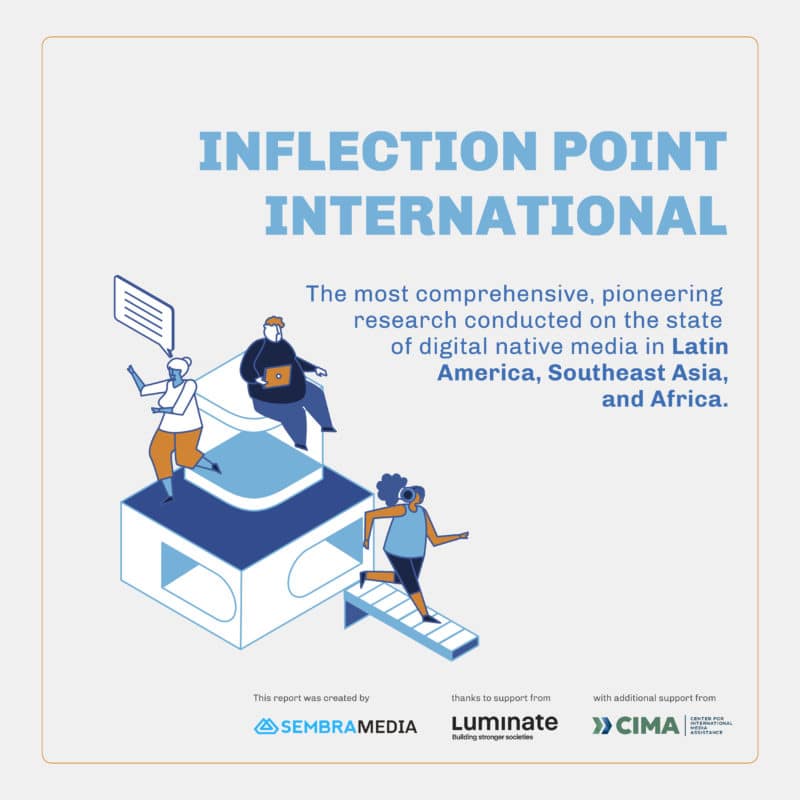
When Maria Ressa, a journalist from the Philippines and co-founder of digital native news site Rappler, was announced as one of this year’s winners of the Nobel Peace Prize, she dedicated the award to all journalists everywhere.
Ressa is an example of a new breed of media innovators and entrepreneurs. Founded in 2012, Rappler used technology, data, and content to bring dynamic and new forms of journalism to its highly engaged readership, with editorial independence enshrined at its core.
Africa, too, has experienced its own explosion of independent digital media over the past decade. Earlier disruptors like South Africa’s Daily Maverick, founded in 2009, are now among the digital veterans. New media start-ups have launched in waves, to become story-tellers and change agents. These include The Continent, a digital newspaper distributed via WhatsApp, to more specialised organisations like Tazama World Media which helps marginalised communities in Kenya.
Africa’s digital native media are responding to African realities and putting their own stamp on how to create positive change and transform societies. But how do they compare against those in other regions? And how many of them will emerge as profitable concerns once the economic fallout of the pandemic is reckoned with?
A new study of digital native media in three continents notes that despite limited resources, many of Africa’s digital news organisations are punching above their weight, uncovering untold stories and creating change.
Of the 49 Ghanaian, Kenyan, Nigerian and South African news organizations interviewed for the Inflection Point International, more than 85 per cent reported having contributed to ‘significant political and societal changes’ – including increased civic engagement, criminal investigations and changes in the law.
Nigeria’s HumAngle trained women displaced by Boko Haram in citizen journalism and armed them with smart phones. This has helped expose scandals in food diversions and food-for-sex in camps.
The work of these media entrepreneurs is being recognized locally, nationally and globally – 57 per cent of African digital newsrooms reported winning national awards for their stories and 28 per cent have won international awards.
Digital native media in Africa are also investing more heavily in solutions journalism. Almost half of the organizations interviewed said they were pursuing some form of solutions journalism, providing policy makers with new ideas for solving intractable social challenges.
Notwithstanding this recognition, more than half of African media organizations reported being the victim of online harassment or threats – and more than a third had suffered Distributed Denial of Service (DDoS) attacks, a common method for taking down a website in which a hacker uses thousands of compromised computers to overload a website, making it impossible for anyone else to visit it. In Ghana and Nigeria, at least half of the media organizations had been subject to a DDoS assault.
Africa’s digital media are filling news deserts and working hard to attract audiences that often feel under-represented by existing media outlets in their markets. Yet many of them have a long way to go before they have viable business models to sustain them for the long term. Hiring in the right expertise is key: those outlets in the study who employed a dedicated staff member to drive revenue earned six to nine times more revenue than those who didn’t.
Philanthropic grant funding has an important role to play in helping outlets bridge to new income streams. Luminate has long worked to support independent media – we see this as an essential component of a healthy democracy. Inflection Point International presents the deepest and broadest research into the state of digital native media in Latin America, Southeast Asia, and Africa with 200 outlets interviewed across the three regions. With this far-reaching report, Africa’s digital media can learn from the successes and challenges in other countries and regions but also offer forward-looking solutions to media outlets elsewhere.
Abdul Noormohamed is Director, Africa for the global philanthropic organisation Luminate.

